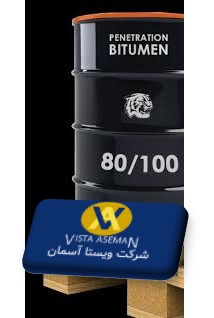Bitumen 80/100, also known as paving grade bitumen, is a commonly used type of bitumen in the construction and road infrastructure industry. It is a highly viscous and thick substance derived from crude oil through a process called fractional distillation. Bitumen 80/100 is characterized by its viscosity, which falls within the range of 80 to 100 centistokes at a standard temperature. This particular grade of bitumen is widely employed for its excellent binding properties and durability, making it an essential component in various road construction projects, including asphalt pavements and road surfaces.

In this introduction, we will explore the key attributes, applications, and significance of Bitumen 80/100 in construction and infrastructure projects.
Bitumen 80/100 is a type of bitumen that is commonly used in road construction and the production of asphalt pavements. It is a standard penetration grade bitumen that is softer than bitumen 60/70 and has a penetration between 80~100 desi-millimeter and a softening point between 42 ~ 50C[1][2][3]. The density of Bitumen 80/100 is in the range of 980 to 1050 kg/m³ at room temperature (0.98 to 1.05 g/cm³) [2]. Bitumen 80/100 is produced during the process of oxidation of vacuum bottom, which is the Bitumen production feedstock that derives from distillation tower residue in vacuum oil refineries at the Bitumen production unit[1]. It is mainly used in the manufacture of hot mix asphalt for bases and wearing courses[1][3]. Bitumen 80/100 is one of the most used bitumen grades and is a basic material for all other bituminous products[3]. The specification of bitumen penetration 80/100 is dedicated in the table below[2]:
|CHARACTERISTICS||TEST METHOD||UNIT||MIN.||MAX.|
|—|—|—|—|—|
|Specific Gravity at 25°C||ASTM D70||°C||1.01||1.05|
|Penetration at 25°C, 100g, 5s||ASTM D5||mm||80||100|
|Softening Point||ASTM D36||°C||42||52|
|Ductility at 25°C||ASTM D113||cm||100|…
|Loss on heating||ASTM …|
Bitumen 80/100 is a widely used material in the construction industry, particularly in road construction and maintenance. Some common uses of Bitumen 80/100 include:
– Road construction: Bitumen 80/100 is widely used in the construction of roads, highways, and pavements. It is used in asphalt as a binding material to glue together aggregate particles to form a strong surface layer that can withstand heavy traffic loads. Since the penetration grade bitumen 80/100 is a soft bitumen, it is more suitable for soils with high particle density such as clay. Because they have a smaller size and the bitumen 80/100, as a soft bitumen, can easily penetrate them.
– Asphalt mixes: Bitumen 80/100 is commonly used for the production of hot mix asphalt for the base and wearing courses. It is a basic material for all alternative bituminous products[4].
– Roofing and waterproofing: Bitumen 80/100 is also used in the construction industry as a roofing and waterproofing material[3].
Overall, Bitumen 80/100 is a versatile material that is used in various applications in the construction industry due to its excellent properties such as high viscosity, good elasticity, and high resistance to deformation and cracking[3].
Bitumen 80/100 is a standard penetration grade bitumen that differs from other grades of bitumen in terms of its properties and applications. Here are some differences between Bitumen 80/100 and other grades of bitumen:
– Bitumen 60/70: Bitumen 60/70 is another common grade of bitumen that is softer than Bitumen 80/100. It has a penetration between 60~70 desi-millimeter and a softening point between 49 ~ 56C[1]. Bitumen 60/70 is more suitable for colder climates and is commonly used in the production of asphalt mixes for surfaces with low traffic loads[1]. In contrast, Bitumen 80/100 is more suitable for soils with high particle density such as clay because it is a soft bitumen that can easily penetrate them[4].
– Bitumen 85/100: Bitumen 85/100 is a bitumen grade that is harder than Bitumen 80/100. It has a penetration between 85~100 desi-millimeter and a softening point between 35 ~ 46C[1]. Bitumen 85/100 is more suitable for surfaces with high traffic loads and is commonly used in the production of asphalt mixes for wearing courses[1].
– Bitumen 40/50: Bitumen 40/50 is a bitumen grade that is softer than Bitumen 80/100. It has a penetration between 40~50 desi-millimeter and a softening point between 52 ~ 60C[1]. Bitumen 40/50 is more suitable for warmer climates and is commonly used in the production of asphalt mixes for surfaces with low to medium traffic loads[1].
Overall, the main differences between Bitumen 80/100 and other grades of bitumen are their penetration and softening point values, which determine their suitability for different applications and climates. Bitumen 80/100 is a versatile material that is widely used in road construction and maintenance for its excellent properties such as high viscosity, good elasticity, and high resistance to deformation and cracking[3][4].
Bitumen is a widely used material in the construction industry, and there are different types of bitumen available with different properties, specifications, and uses based on the requirements of the consuming industry. The following are some common grades of bitumen and their properties:
1. Penetration Grade Bitumen: This is the most commonly used type of bitumen in road construction. It is refinery bitumen that is manufactured at different viscosities. The penetration test is carried out to characterize the bitumen based on its hardness. The penetration bitumen grades range from 15 to 450 for road bitumen, but the most commonly used range is 25 to 200. The penetration grade bitumen is classified into different grades based on its penetration value, which ranges from 15 to 450 dmm[1]. Bitumen 80/100
2. Oxidized Bitumen Grades: This type of bitumen is produced by blowing air through hot bitumen. The process of oxidation increases the viscosity and softening point of the bitumen, making it suitable for various applications such as roofing, waterproofing, and sealing. Oxidized bitumen grades are classified based on their softening point and penetration value[3].
3. Cut Back Bitumen: This type of bitumen is produced by adding a solvent to the bitumen to reduce its viscosity. The solvent used can be either gasoline or kerosene. Cutback bitumen is classified based on the type of solvent used, such as rapid-curing (RC), medium-curing (MC), and slow-curing (SC) [1].
4. Bitumen Emulsion: This type of bitumen is produced by mixing bitumen with water and an emulsifying agent. Bitumen emulsions are classified based on their setting time, which can be either rapid-setting (RS), medium-setting (MS), or slow-setting (SS) [1].
5. Polymer Modified Bitumen: This type of bitumen is produced by adding a polymer to the bitumen to improve its properties such as elasticity, durability, and resistance to deformation and cracking. Polymer modified bitumen is classified based on the type of polymer used, such as styrene-butadiene-styrene (SBS), styrene-butadiene rubber (SBR), and ethylene-vinyl acetate (EVA) [3].
Overall, the different grades of bitumen have different properties and are suitable for different applications based on their penetration value, softening point, and other physical properties. It is essential to choose the right grade of bitumen based on the requirements of the project to ensure its durability and longevity[5].
Penetration grade bitumen and performance grade bitumen are two different types of bitumen that differ in their properties and specifications. Here are some differences between the two: Bitumen 80/100
Penetration Grade Bitumen:
– Refinery bitumen that is manufactured at different viscosities.
– Classified based on the hardness of the bitumen, determined by the penetration test. Bitumen 80/100
– Penetration values range from 15 to 450 for road bitumen, but the most commonly used range is 25 to 200.
– Used in road construction and for the production of asphalt pavements with superior properties.
– Suitable for surfaces with low to medium traffic loads.
Performance Grade Bitumen:
– Graded based on its performance at different temperatures.
– Classified based on the temperature range in which it performs best.
– Used in the construction of high-performance pavements that can withstand heavy traffic loads and extreme weather conditions.
– Offers improved resistance to deformation and cracking compared to penetration-grade bitumen. Bitumen 80/100
– Suitable for surfaces with high traffic loads.
Overall, penetration grade bitumen is commonly used in road construction for surfaces with low to medium traffic loads, while performance grade bitumen is used for high-performance pavements that can withstand heavy traffic loads and extreme weather conditions. The choice of bitumen type .
depends on the requirements of the project and the expected performance of the pavement
Bitumen 80/100, a commonly used grade of bitumen, finds a wide range of applications in the construction industry due to its versatile properties. Here are some of the key applications of Bitumen 80/100 in construction:
Road Construction: Bitumen 80/100 is extensively used in road construction for asphalt pavements. It serves as a binding agent, creating a durable and flexible surface that can withstand heavy traffic loads. The flexibility of bitumen helps prevent cracks and deformations in the road surface.
Roofing: Bitumen is employed in roofing materials, including built-up roofing systems (BUR) and modified bitumen roofing. These systems provide excellent waterproofing and weatherproofing properties, making them suitable for flat or low-sloped roofs.
Waterproofing: Bitumen 80/100 is widely used for waterproofing applications in construction. It is applied to foundations, basements, and retaining walls to prevent water infiltration and protect structures from moisture damage.
Pavement Maintenance: Bitumen emulsions made from Bitumen 80/100 are used for pavement maintenance activities like crack sealing, pothole patching, and surface rejuvenation. These emulsions are easy to handle and offer effective solutions for extending the lifespan of existing pavements.
Expansion Joints: Bitumen is used to fill expansion joints in concrete structures such as bridges and highways. It provides a flexible seal that accommodates the movement of the structures without compromising their integrity.
Tunnel Construction: In tunnel construction, Bitumen 80/100 is utilized for tunnel lining and waterproofing. It forms a protective barrier against groundwater and helps maintain structural stability.
Sports Surfaces: Bitumen-based materials are used in the construction of sports surfaces like tennis courts, running tracks, and playgrounds. These surfaces offer good shock absorption and are suitable for various sporting activities.
Soundproofing: Bitumen is used as a soundproofing material in construction. It is applied to walls, ceilings, and floors to reduce noise transmission and create quieter indoor environments.
Adhesives and Sealants: Bitumen-based adhesives and sealants are employed in various construction applications, including bonding roofing materials, sealing joints, and attaching insulation boards.
Pipeline Coating: Bitumen 80/100 is used for external pipeline coating in the oil and gas industry. It provides corrosion protection and insulation for pipelines, ensuring their long-term integrity.
Manufacture of Building Materials: Bitumen is an essential component in the production of various construction materials such as asphalt shingles, roofing felt, and bituminous paints.
Bitumen 80/100’s versatility, durability, and waterproofing properties make it a crucial material in the construction industry. Its applications span from road infrastructure to building protection, contributing to the longevity and performance of structures and surfaces.




